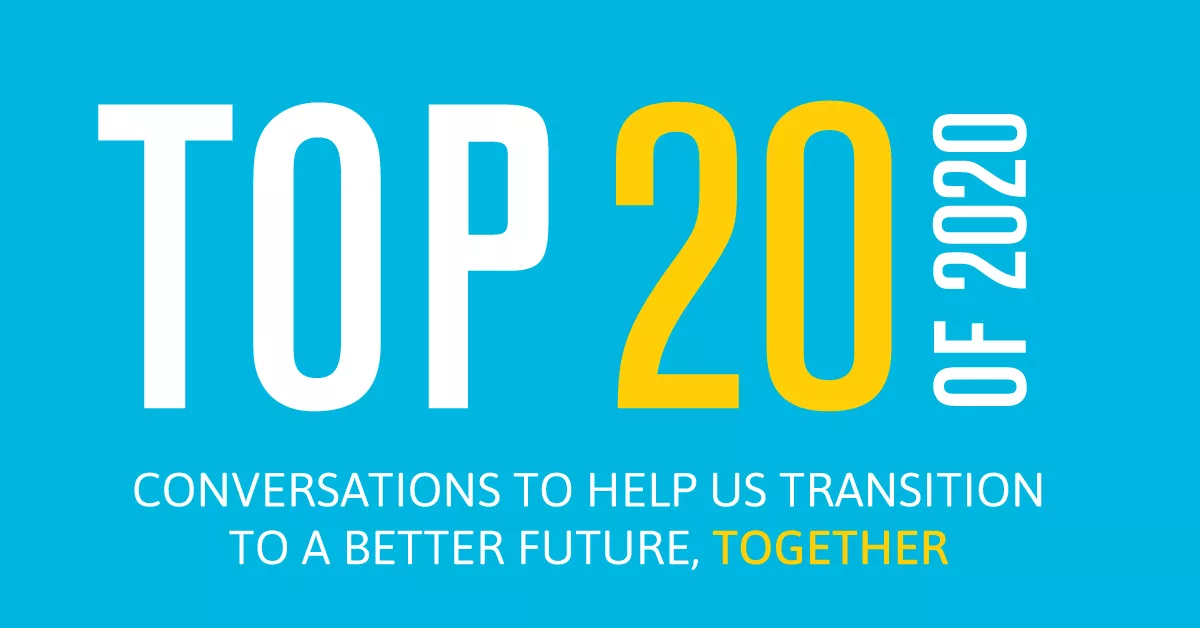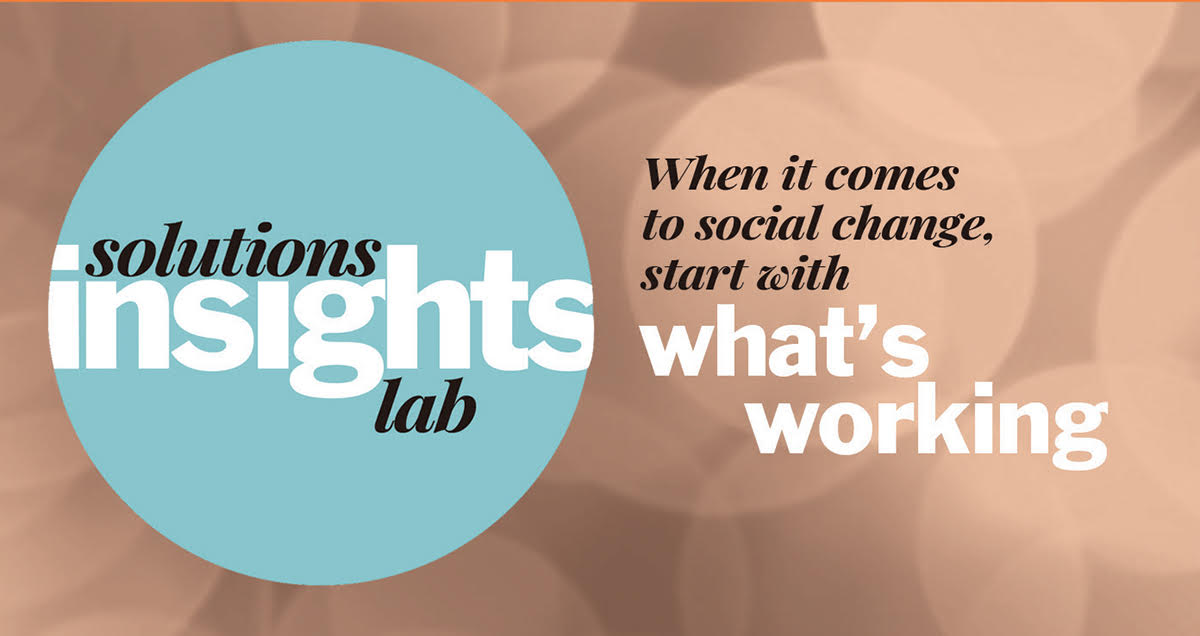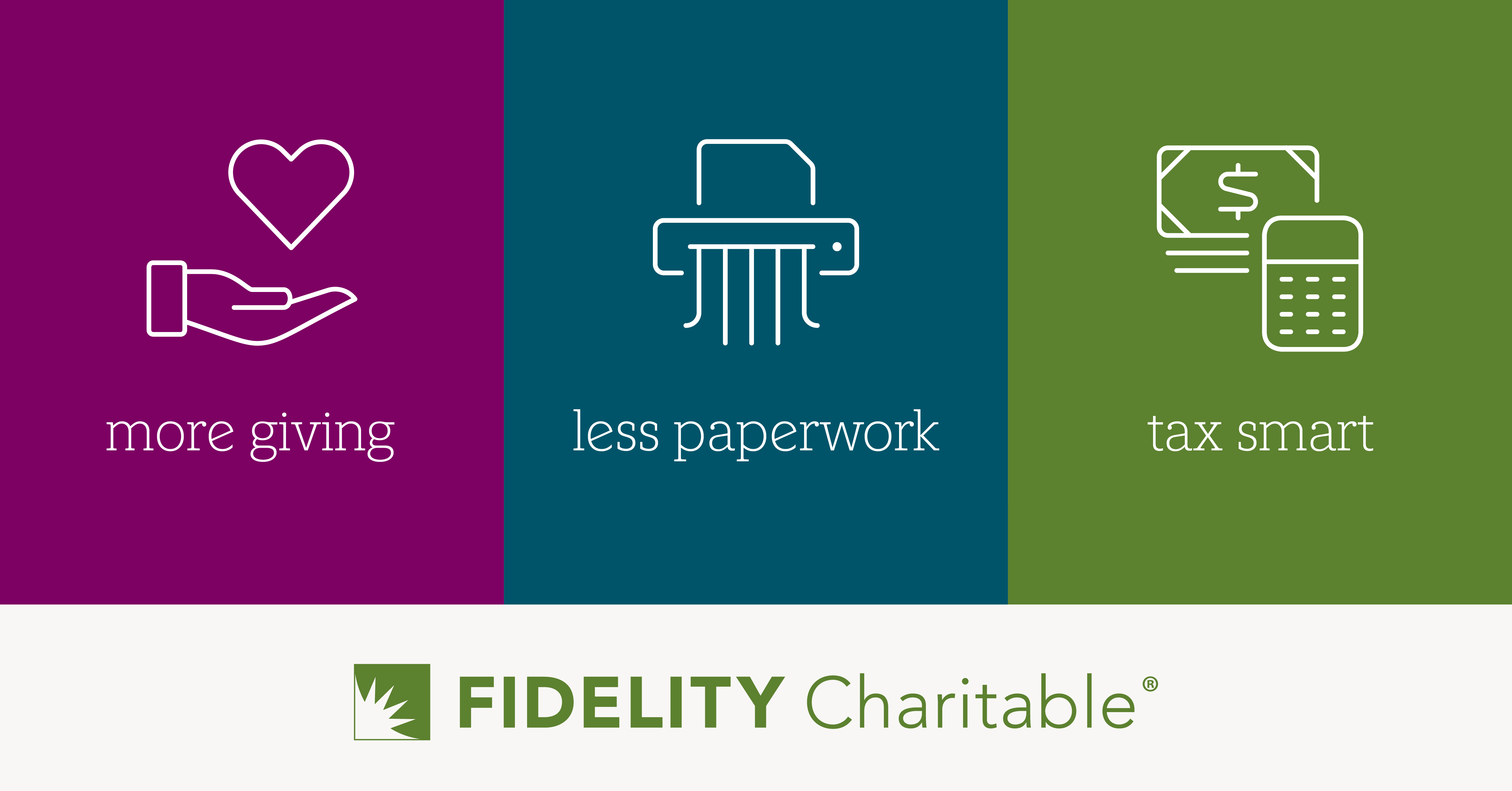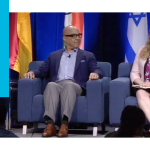The Year Provided Deeper Looks Into Impact Investing, Dismantling Structural Racism, and Building a Regenerative Future
Our work at SOCAP Global is rooted in radical collaboration. By bringing together diverse perspectives to work toward collective, inclusive action, the conversations we hosted in 2020 provided examples of how to find opportunities for lasting change out of crisis. As conveners of these big-picture conversations, we were regularly inspired by the innovation, determination and resilience of our community to experiment with solutions, share learnings, and tackle seemingly intractable problems — together.
Below we share a curated list of the 20 conversations from 2020 that should be carried forward to bring about the impact economy in a meaningful, lasting way.
SOCAP Virtual 20
Impact Investing on the Precipice
Darren Walker, President of the Ford Foundation, and Sir Ronald Cohen, join Monique Aiken in a wide-ranging, intimate conversation between friends on how to meet the needs of the world’s great challenges by reimagining the future of capitalism in this unprecedented moment.
Indigenous Pathways to a Regenerative Future
From SOCAP Virtual 20: Alexis Bunten of JumpScale; Nick Estes, Author and Journalist; and Sikowis (Christine) Nobiss of the Great Plains Action Society covered ways to reach a regenerative economy, one that takes us away from colonial-capitalism, which relies on forceful acquisition, extraction, privatization, and a permanent underclass all enforced by policy and laws. The Indigenous-led strategies discussed in this fireside chat are centered around a regenerative economy that Indigenous Peoples have been leading already today.
The System Isn’t Broken This Is How it Was Built. How Do We Rebuild?
Capitalism needs a new operating system. We can no longer ask leaders to lead in a system with misaligned incentives and a culture with contrary norms.
Every problem the SOCAP community and beyond is trying to solve around the world requires breakthrough direct actions, and structural changes in the incentives that drive economic behavior. Without culture and policy shifts there is no systems change. Based on insights gleaned from 300+ global leaders, B Lab is ready to reimagine and redesign our economic system in service of justice, dignity and equity. Let’s be in active co-creation together. In this session from SOCAP Virtual 20, we heard perspectives from three leaders as they address behavior change, culture and policy.
Announcing the 2020 SOCAP Virtual Scholarship Entrepreneur Winners
Every year, SOCAP grants more than 100 scholarships to social entrepreneurs from all over the globe. Because of COVID-19, entrepreneurs joined the conference, along with other attendees, virtually. For the first time as part of our scholarship program SOCAP, in partnership with Yerba Buena Center for the Arts (YBCA), we welcomed a cohort of artist entrepreneurs, with a particular focus on artists of color who are creating enterprises and impact in their communities. We also created our inaugural SOCAP Scholarship Entrepreneurs Lookbook, featuring each of our scholarship recipients and their organizations, missions, and investments needed to reach their goals. Meet the 2020 entrepreneurs, representing incredible solutions to pressing social, cultural, and environmental problems from across the globe!
Achieving True Racial Equity in Asset Management and Deployment Spaces
When considering racial equity in impact and philanthropic investment spaces we must examine both who is managing the investment of assets for people and institutions of wealth, as well as who is managing the deployment of those assets. The percentages of POC-led firms in these spaces hover at or below a dismal 1%. This session will provide inspiration to influence your organization’s engagement of philanthropic and asset managers of color leading to a better alignment in equity goals.
Impact investors have raced to respond to the health, economic and social crises that have unfolded over the past year, supporting critical response and recovery efforts in communities across the globe. It is important to ask how these crises will reshape impact investing. Vital institutions are being strained, investment strategies are being tested and stakeholders are rightfully demanding a more authentic role in determining how impact capital affects their lives. In this session, Cathy Clark, Fran Seegull and Monique Aiken discuss the questions and trends that will chart impact investing’s course through the recovery and for years to come.
Lightning Bolt: Food Tech CEOs, Minimizing our GHG Emissions, One Bite at a Time
Agriculture is one of the biggest contributors to greenhouse gas (GHG) emissions, with livestock making up roughly 9% of all human-induced emissions. The best way to combat the status quo is through innovation and entrepreneurship. In this session, we heard from the CEOs of Airprotein, Clara Foods, and the Jackfruit company, who shared how they are making the foods we love in a healthy, environmentally friendly manner. All three companies are alumni of the Unreasonable Impact program created with Barclays, and they are true examples of how we need “Unreasonable” people to solve the world’s biggest problems.
Lightning Bolts: Catalytic Capital Driving Impact
This was a lively session of two Lightning Bolts: Catalytic Capital in Crisis Response: When Boring is Beautiful, and Our Sector’s Founding Falsehood: Doing Well by Doing Good is Not Doing Enough, followed by moderated Q&A. In Our Sector’s Founding Falsehood, we heard about how, In the face of a world beset by economic insecurity exacerbated by systemic racism and inequality, those who wish to genuinely address these challenges must be prepared to abandon the sector’s founding myth that impact investing requires no financial trade-offs. Vulnerable, marginalized communities need catalytic, low-cost, patient capital. This Bolt will challenge those who claim the mantle of “impact investment” to devote more of their capital to impact-first opportunities and will demonstrate how Ceniarth, the family office of Diane Isenberg, is embracing this vision. In Catalytic Capital in Crisis Response, Yasemin Saltuk Lamy, Deputy CIO at CDC Group, the UK’s development finance institution, presented a personal and professional journey of pioneering impact investment, with a focus on the role of the CDC’s Catalyst Strategies in crisis response.
Money + Meaning and World-Changing Women Podcasts
The History of Impact Investing with Antony Bugg-Levine
This conversation with Antony Bugg-Levine of the Nonprofit Finance Fund spans the history and evolution of the field of impact investing, from a revolving loan fund created in Benjamin Franklin’s will to the Community Reinvestment Act of 1977 through the meeting where the phrase “impact investing” was coined in 2007. Antony also discusses the direct line between the civil rights movement and the modern field of impact investing. Lastly, he discusses his work with the Nonprofit Finance Fund and where he is finding hope during the current pandemic.
How to Start Impact Investing with Beth Bafford
From the Money + Meaning Podcast: In this episode, we dive into the details of one of the most common questions we get: how do you start impact investing? What does it actually look like in practice for someone who doesn’t have a family office or run a foundation? Joining us to walk us through her process of moving her personal portfolio to impact is Beth Bafford, the VP of Syndications and Strategy at Calvert Impact Capital. We talk about the first steps she took to shift her portfolio, the differing processes across asset types, areas where she still wishes there were better impact offerings, and her most impactful investments to date.
Perseverance and Building Equitable Companies with Cheryl Contee
In this episode of World-Changing Women, we spoke with serial tech entrepreneur, Cheryl Contee. Cheryl co-founded and sold her first company, Attentive.ly, and is now the CEO and Founder of the mission-driven digital agency, Do Big Things. On top of that, Cheryl is the author of Mechanical Bull: How You Can Achieve Startup Success, and she’s an award-winning political blogger. We recorded this conversation on June 3rd, 2020, in the midst of national protests of the murder of George Floyd. In our conversation, we talk about systemic racism in business and building diverse and equitable workplaces.
SPECTRUM 2020
Special Address from Stacey Abrams
From SPECTRUM 2020: Stacey Abrams of Fair Fight & Southern Economic Advancement Project discusses racial injustices and change-makers at Spectrum 2020. In her address, Abrams calls for real solutions to the injustices of our time, emphasizing the disproportionate effects of the coronavirus pandemic and its economic fallout on communities of color. She says investing in these communities and voting are important ways to affect change.
Rashad Robinson, President of Color of Change; Crystal Echo Hawk, President and CEO of IllumiNative, and Cynthia Muller, Director of Mission Investments at the W.K. Kellogg Foundation discuss the dual plagues of the global pandemic and ongoing racial injustices that are shining a powerful light on the cracks and gaps in our systems and revealing the horrific toll of unchecked racial inequities that affect communities of color. This session focused on the intersection of policy, activism and capital, highlighting organizations using a range of mechanisms in the fight for justice from some of the most influential voices on the front lines, demanding justice for our communities.
Lightning Bolt: Future Folklore
From SPECTRUM 2020: A narrative is many, many stories. Myth, narrative, folklore and fables do we realize how much we live and operate out of them? What is the mythos of our humanity right now? How do we shift it to one of love, belonging and inclusion? What does it mean to construct our future folklore? In this Lightning Bolt session, Michael O’Bryan, Director of Learning at The Village of Arts and Humanities, covered the science of imagination and how it can shift narratives.
Lightning Bolt: Natalie Molina Nino
From SPECTRUM 2020: Nathalie Molina Niño, CEO of O3 reflected on what she has been thinking on and responding to in the midst of the pandemic, protests and riots across the country. Always known for taking action, she highlighted some of the tangible steps that need to be addressed to begin a concerted shift around racial bias in capital markets and to close the racial wealth gap.
Marc Bamuthi Joseph Performance
From SPECTRUM 2020: Marc Bamuthi Joseph, Vice President and Artistic Director of Social Impact at The John F. Kennedy Center for the Performing Arts, closed out SPECTRUM 2020 with a powerful performance about the systematic racism plaguing the country. In his poem, he compares this racism to the coronavirus pandemic: “Suddenly, you realize that you can’t breathe. The disease was inevitable, but the fallout is preventable. We cannot eliminate racism, but could we, America, cure ourselves of racial injustice?”
Total Impact
Performance of ESG and Sustainable Funds
This conversation focuses on the performance of ESG and sustainable funds during the current market volatility. How are they performing relative to market benchmarks? Why has the “S” been the hardest to adopt? Are investors pulling back from impact in favor of “safer” investments or increasing their allocations to impact?
Radical Collaboration and SOCAP 365 Webinar Series
How Impact Investing Can Help Get People Back to Work
From the: Impact investors, policymakers, for-profit companies and the third sector need to collaborate in new ways in the face of the radical disruption of work and working patterns. This discussion will explore the opportunities for impact investors to address the major unemployment challenges we are likely to face in the coming months and years. This conversation was held with Joann Chen, Director of Employment Technology Fund (ETF@JFFLabs); Joe Ludlow, Impact Investment Director at Ufi VocTech Trust; Nick Kind, Senior Director EMEIA, Tyton Partners; and Andrea Mainelli, Senior Advisor, Tyton Partners.
Policy and Practice: Critical Strategies for Dismantling Structural Racism
Racism is a system and needs to be dismantled as a system. This includes policy, practice, strategy, and norms. These are some of the elements of systems change and tangible examples of how to deliver different results. How are policies affected, how are strategies used, what do we learn from our actions. How do these add up so that the whole becomes more than the sum of its parts? How can and should policy be changed at a local level and system level? Erika Seth Davies, our SOCAP 365 series facilitator, was joined in this conversation to help answer these questions by Vincent “Vinny” Green, Event Director, Taharka Brothers; Lucas Turner-Owens, Founding Partner, The Sankofa Group; Amir Kirkwood, Chief Lending and Investment Officer, Opportunity Finance Network; and Michelle Geiss, Executive Director, Impact Hub Baltimore.
Integrate Conference
Leading the Journey Toward Integrated Multicapital Business Leadership and Stakeholder Capitalism
In this keynote address, Harmit Singh shares a CFO’s account of the ambition, progress to date, and practical realities of Levi Strauss & Co’s journey toward multicapital decision-making, innovation, and stakeholder engagement.







